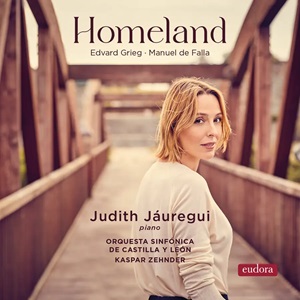
Homeland
Edvard Grieg (1843-1907)
Piano Concerto in A minor, Op 16 (1868)
Manuel de Falla (1876-1946)
Noches en los Jardines de España (1909-16)
Judith Jáuregui (piano)
Orquesta Sinfónica de Castilla y León/Kaspar Zehnder
rec. 2023, Auditorio Miguel Delibes, Valladolid, Spain
Eudora EUD-SACD-2405 [56]
Iberian warmth and Nordic chill may seem odd companions, but a sense of home, of belonging is universal and these two works are happy companions. Both works are redolent of the music of their homes. The famous descending octaves of Grieg’s concerto contain intervals commonly found in Norwegian music. The finale is in the form of a halling, a traditional Scandinavian dance whose athleticism matches that of Grieg’s pianism. Similarly, Cante Jondo from Andalusian flamenco, the strumming of guitars and the magic and mystery of the Spanish night pervade every note of de Falla’s colourful symphonic impressions. At a time when composers travelled to Germany or Italy to perfect their art, they, perhaps inevitably, took on the characteristics of those lands in their writing. Conversely, Grieg and de Falla were just two who felt it important to write music that spoke of their land and culture. Their music stands testament to how successfully they demonstrated the value and vitality of their respective cultures on the international stage.
Grieg’s concerto of course remains as popular today as it ever has. It was the first concerto ever committed to disc, a seriously abridged version recorded by Wilhelm Backhaus in 1909 (APR Recordings APR7317) and must be one of the most recorded – has anyone ever counted? I opened with the generalised idea of Scandanavia’s Nordic chill, but the one time I went to Bergen it felt as Mediterranean as the south of France. Grieg’s concerto is just as sunny and warm-hearted. Spanish pianist Judith Jáuregui clearly finds herself at home in its pages and she is ably partnered by Kaspar Zehnder and his Spanish players who give lively, rhythmic performances. Jáuregui plays magnificently with a sure technique, silky legato and a keen sense of the dance elements, especially in the finale; gripping and energetic while observing Grieg’s allegro molto moderato indication.
Manuel de Falla’s Nights in the gardens of Spain is dazzling and colourful, evoking the spirit and atmosphere of the gardens of de Falla’s Andalusia. Though the first offers a specific inspiration, the 13th Century generalife gardens of the Alhambra, the second is simply titled distant gardens. The third paints a picture of the gardens of the Sierra de Córdoba, perhaps a heady mix of the bustle of fiesta evenings and the natural wildness of the Sierras Subbeticas. Certainly for me the expansive and tranquil close to the work reflects the latter, though de Falla was eager to point out that the music makes no pretence of being descriptive, it is merely expressive. Expressive and richly luxuriant, it is hard to see why this beautiful piece hasn’t gained the popularity of a work like Rodrigo’s Concierto de Aranjuez. Perhaps it is that the piece is more about colour than melody, for all that it has its share of tunes; even the wonderful climactic moment at the end of the first movement is not really a tune you come away humming. Perhaps, too, it is that an audience expects a concerto. Though its piano part is demanding, it is more along the lines of Vincent D’indy’s Symphony on a French Mountain Air, where it is used to create a distinct colour. Whatever the reason, I would encourage anyone to get to know it as it demands repeated hearing and its evocative music fills my head for days after I hear it. The distant sound of guitars softly serenading, or strident flamenco along with the rhythmic snap of castanets are clearly represented throughout. The whole tone harmony and impressionism that he was surrounded by during his time in Paris finds its place here, though he is sparing in its use. More often he aims for simplicity and a clarity of writing that echoes the sound of folk dances and idioms.
The performances, especially in the de Falla, are outstanding, as is the range of colour and rhythmic vitality summoned by Jáuregui and her collaborators. They are recorded in startlingly vivid and clear sound, with a magnificent balance of timbre. Eudora and Jáuregui should be commended on a disc that I have returned to again and again over the past few weeks and will continue to do so.
Rob Challinor
Buying this recording via a link below generates revenue for MWI and helps us keep free access to the site


















